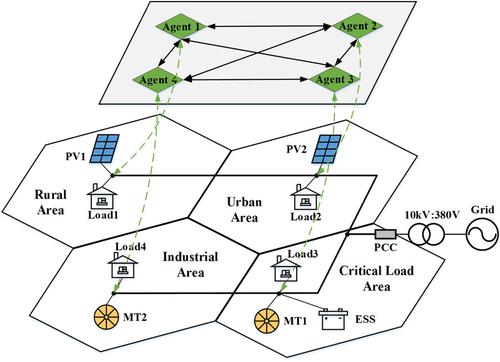当前位置:
X-MOL 学术
›
Energy Sci. Eng.
›
论文详情
Our official English website, www.x-mol.net, welcomes your feedback! (Note: you will need to create a separate account there.)
Game‐based distributed energy‐sharing model for prosumers in microgrids considering carbon emissions and its fast equilibrium‐finding method
Energy Science & Engineering ( IF 3.8 ) Pub Date : 2024-03-04 , DOI: 10.1002/ese3.1712 Xinze Zheng 1 , Qiang Li 1 , Juzhong Yuan 1
Energy Science & Engineering ( IF 3.8 ) Pub Date : 2024-03-04 , DOI: 10.1002/ese3.1712 Xinze Zheng 1 , Qiang Li 1 , Juzhong Yuan 1
Affiliation

|
In recent years, energy sharing has attracted a lot of attention. However, the intermediate platforms in centralized energy‐sharing methods cause the rapid growth of communication complexity and the risk of privacy leakage. Unlike complex energy‐sharing market mechanisms, in this paper, a simple and efficient distributed energy sharing for microgrids (MGs) is proposed, where game theory is employed to form flexible prices for prosumers and only local information is used to improve the privacy protection of prosumers. First, prosumers located in different areas are characterized more precisely and a two‐tier carbon emission cost model is built. Next, a game‐theory‐based distributed energy‐sharing model is proposed, where a flexible pricing mechanism is developed to enable prosumers to independently reach price agreements and achieve supply–demand balance within MGs. In the process, optimization models for obtaining equilibrium are formed and only local information is needed. However, solving these optimization models is generally time‐consuming. So, a distributed optimization method based on weighted subgradients is proposed to accelerate the equilibrium‐finding process. Finally, four cases are designed, and simulation results demonstrate that the prosumers' costs of our method are reduced by 7.5%–22.5% compared to the costs obtained by feed‐in tariff. Moreover, in the case of solving the distributed trading model for an MG at a 24‐h time scale, the iteration numbers of our method are only 38.9% and 49.3% of the two traditional solving methods.
中文翻译:

考虑碳排放的微电网产消者博弈分布式能源共享模型及其快速平衡发现方法
近年来,能源共享引起了广泛关注。然而,中心化能量共享方法中的中间平台导致通信复杂性快速增长以及隐私泄露的风险。与复杂的能源共享市场机制不同,本文提出了一种简单高效的微电网(MG)分布式能源共享,其中采用博弈论为产消者形成灵活的价格,并且仅使用本地信息来提高产消者的隐私保护。产消者。首先,更精确地表征不同地区的产消者,并建立了双层碳排放成本模型。接下来,提出了一种基于博弈论的分布式能源共享模型,其中开发了灵活的定价机制,使产消者能够独立达成价格协议并实现MG内的供需平衡。在此过程中,形成了获得平衡的优化模型,并且只需要局部信息。然而,求解这些优化模型通常非常耗时。因此,提出了一种基于加权次梯度的分布式优化方法来加速平衡发现过程。最后,设计了四个案例,模拟结果表明,与上网电价补贴获得的成本相比,我们的方法的产消者成本降低了7.5%~22.5%。此外,在24小时时间尺度上求解MG的分布式交易模型时,我们的方法的迭代次数仅为两种传统求解方法的38.9%和49.3%。
更新日期:2024-03-04
中文翻译:

考虑碳排放的微电网产消者博弈分布式能源共享模型及其快速平衡发现方法
近年来,能源共享引起了广泛关注。然而,中心化能量共享方法中的中间平台导致通信复杂性快速增长以及隐私泄露的风险。与复杂的能源共享市场机制不同,本文提出了一种简单高效的微电网(MG)分布式能源共享,其中采用博弈论为产消者形成灵活的价格,并且仅使用本地信息来提高产消者的隐私保护。产消者。首先,更精确地表征不同地区的产消者,并建立了双层碳排放成本模型。接下来,提出了一种基于博弈论的分布式能源共享模型,其中开发了灵活的定价机制,使产消者能够独立达成价格协议并实现MG内的供需平衡。在此过程中,形成了获得平衡的优化模型,并且只需要局部信息。然而,求解这些优化模型通常非常耗时。因此,提出了一种基于加权次梯度的分布式优化方法来加速平衡发现过程。最后,设计了四个案例,模拟结果表明,与上网电价补贴获得的成本相比,我们的方法的产消者成本降低了7.5%~22.5%。此外,在24小时时间尺度上求解MG的分布式交易模型时,我们的方法的迭代次数仅为两种传统求解方法的38.9%和49.3%。



























 京公网安备 11010802027423号
京公网安备 11010802027423号